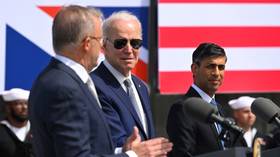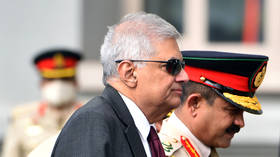China issues nuclear warning over AUKUS pact
Chinese officials have said the Western nuclear tech-sharing deal could kick off a new arms race
The international community must address nuclear “proliferation risks” posed by the three-way AUKUS agreement between the US, UK and Australia, Beijing’s envoy to the International Atomic Energy Agency (IAEA) has said.
Speaking before the IAEA board of governors on Friday, Chinese envoy Li Song argued that the AUKUS deal “runs counter to the purpose and objectives” of the landmark Treaty on the Non-Proliferation of Nuclear Weapons (NPT), and threatens the Asia-Pacific region.
Li went on to call for formal “intergovernmental discussions” on the AUKUS pact between IAEA member states, saying they “have enough wisdom, patience and determination to properly respond to the AUKUS-related proliferation risks.”
AUKUS was established in 2021 between Washington, Canberra and London in part to facilitate the transfer of military technology among the three allies, with the US military pledging to help Australia obtain nuclear submarines.
Though officials from each country have maintained that the bloc is not a formal military alliance and is solely focused on technology-sharing, Beijing has condemned the project, claiming it would only kick off an arms race in Asia and help to spread nuclear weapons around the globe.
“The three countries have gone further down the wrong and dangerous path for their own geopolitical self-interest, completely ignoring the concerns of the international community,” Chinese Foreign Ministry spokesman Wang Wenbin said earlier this year, adding that the AUKUS pact is based on a “Cold War mentality which will only motivate an arms race, damage the international nuclear nonproliferation regime, and harm regional stability and peace.”
In previous comments to the UN nuclear watchdog, Li argued the IAEA’s “current safeguards system is not able to achieve effective monitoring” for technology-sharing between the AUKUS partners, adding that the deal “seriously undermines the authority of the Agency and its safeguards system.”
Tensions between Washington and Beijing have steadily escalated in recent years, with US President Joe Biden repeatedly labeling the People’s Republic as America’s top “competitor” and deploying warships to waters near China on a near-monthly basis since taking office. Though the US leader recently held “productive” talks with his Chinese counterpart, Biden went on to label Xi Jinping a “dictator” soon after the meeting, prompting a sharp response from Beijing.
You can share this story on social media:









Comments are closed.